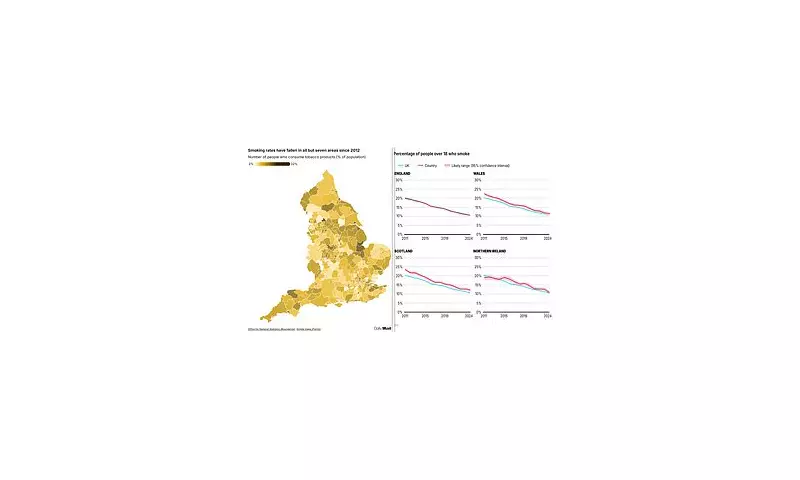
While Britain celebrates record low smoking rates, concerning new data reveals seven areas in England have actually seen an increase in tobacco use over the past 14 years.
Official figures from the Office for National Statistics show just 9.1% of British adults admitted to smoking last year, down significantly from 10.5% in 2023 and a dramatic reduction from nearly 50% during the 1970s.
Regional Disparities Revealed
Despite the positive national trend, analysis of local data reveals stark regional variations. East Staffordshire has experienced the most dramatic growth in smoking rates, jumping from 10.7% of the population in 2012 to 17.3% in 2024 - a substantial 6.6% increase.
South Holland in Lincolnshire recorded the second-highest rise at 3.7%, while Exeter and Babergh tied for third place with 2.7% increases each.
At the opposite end of the spectrum, Folkestone and Hythe along with Stevenage both achieved remarkable 20.8% reductions in smoking rates - the largest decline nationwide. Dover followed closely with an 18.9% decrease, where smoking prevalence now stands at just 6.2% compared to 25.1% in 2012.
Vaping Overtakes Smoking for First Time
The declining smoking rates coincide with a significant shift toward alternative nicotine products. A record 5.4 million UK adults now use e-cigarettes, surpassing traditional cigarette smokers for the first time in history.
Daily vaping is most prevalent among those aged 25 to 34 (9.3%) and 35 to 49 (9.5%). However, overall vaping usage remains highest among 16 to 24-year-olds, with 13% using e-cigarettes either daily or occasionally despite legal restrictions on sales to under-18s.
Health campaigners have expressed concern about manufacturers targeting younger users with colourful packaging resembling highlighter pens and child-friendly flavours like bubblegum and cotton candy.
Government Crackdown and Industry Response
The government has responded with the Tobacco and Vapes Bill currently progressing through the House of Lords. This landmark legislation would make it illegal for anyone born on or after 1 January 2009 to ever purchase tobacco products.
The bill also grants powers to restrict e-cigarette packaging, marketing and flavours, receiving support from over 1,200 health professionals including doctors, nurses and public health directors.
Simon Clark, director of smokers' rights group Forest, warned that the proposed generational tobacco ban could backfire, potentially fueling black market activity and encouraging smoking as "a form of soft rebellion."
Meanwhile, British American Tobacco acknowledged the positive trends but cautioned that restricting communication about reduced-harm alternatives might jeopardise further progress toward smoke-free ambitions.
Caroline Cerny of Action on Smoking and Health highlighted that while overall trends are positive, smoking remains disproportionately high among socially disadvantaged groups and those living with severe mental illness, emphasising the need for targeted support initiatives.






